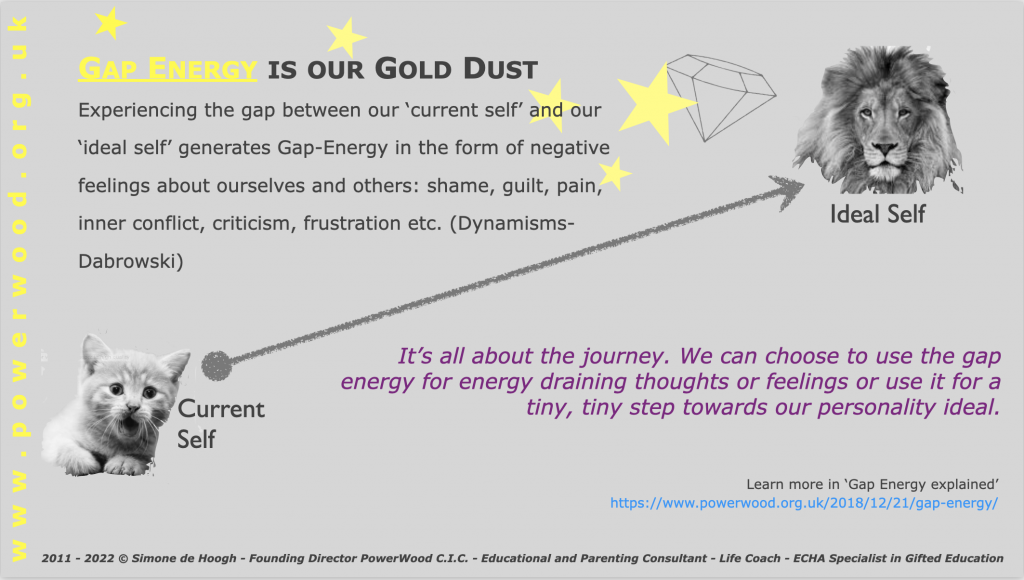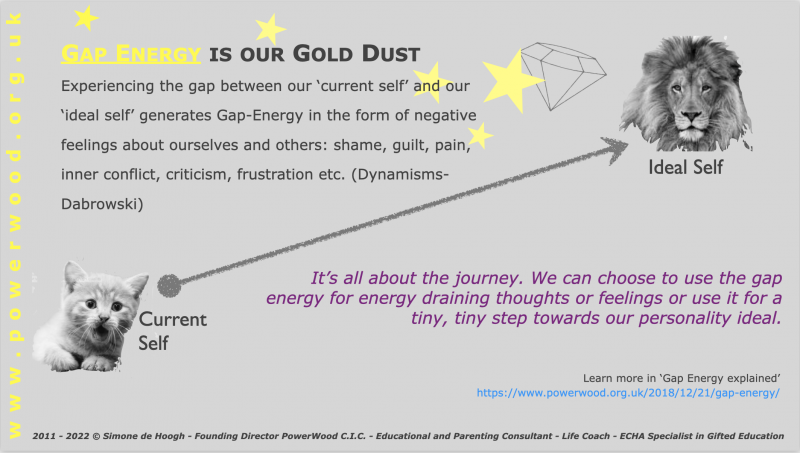
Updated 03-04-2019
Gap Energy is a Concept in the Multilevel Emotion Regulation Theory (MERT) developed by Simone de Hoogh.
Every time we are aware that we are our ‘current self’, whilst envisioning our personality ideal ‘ideal self’ that we are not living up to, we are experiencing Gap-Energy and it can create a lot of negative feelings, thoughts and behaviour (what we call ‘not helpful feelings, thoughts of behaviour’ to prevent negative suggestion) about ourselves and others.
If we were not aware of this personality ideal we would have no drive whatsoever to learn and grow and we would never read this page. We would be just content with the way we are, the way we behave and interact with others.
Dabrowski believed that more than 60% of people did not have this gap between where we are in our development and our personality ideal, creating what he called Dynamisms and one also had to have innately Overexcitability and what he called ‘the third factor’ to be able to use those dynamisms for personal growth.
“The third factor is the dynamism of conscious choice by which an individual develops and exercises autonomy in expressing his or her unique personality characteristics. The third factor has a genetic basis but, as it develops, it becomes an emergent and autonomous force, transcending its genetic origins.
As third factor develops, it compels us to make choices that express our authentic self; seeking what is “more me” and rejecting aspects that are “less me.”” Source: The Theory of Positive Disintegration by Kazimierz Dąbrowski by Bill Tillier.
In my experience and that of many of the families and individuals I worked with over the years, this ability called by Dabrowski ‘The Third Factor’ is something that can be activated, nourished and grown by applying MERT (Multilevel Emotion Regulation Theory)
The Gap-Energy
We see all those not helpful feelings: shame, guilt etc, those Dynamisms, as our Gap-energy. This energy is a gift to us. We can use the energy either to pull ourselves down or lift ourselves up.
The following picture shows an overview of the gap dynamics and energy.

Having the Gap is what makes us special. All the ‘not helpful feelings’ about self are the energy that makes us want to improve ourselves, our relationships, and maybe even the world as you can read in Crushing Feelings led to very rewarding Eternal Quest of Self-Development.
Read on:
Crushing Feelings led to very rewarding Eternal Quest of Self-Development
Overwhelmed by guilt and shame while parenting? Congrats! (including the Awareness Mantra)
How to stop hurting when our Child is in Pain
Am I a Rubbish Mum? – The Unexpected Value of Self-Criticism
Top 3 Tips to Up your Baseline (Energy and Resilience Level)
Subscribe to PowerWood’s email newsletter (in the right-hand sidebar) and you will be the first to know when new posts are being published.
Emotion Regulation
Multilevel Emotion Regulation Theory (MERT) is a holistic theory developed by Simone de Hoogh. The theory explains how neurodiverse (young) individuals and parents of neurodiverse children can develop emotional regulation skills and direct their energy towards self-chosen goals, and contribute to society.
Join PowerWood

